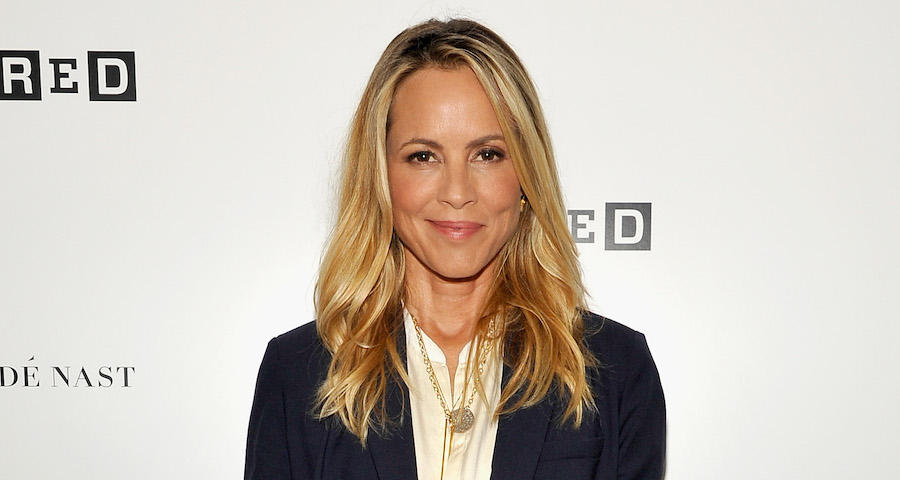Maria Bello has managed to mostly avoid one genre: the horror film. But “Lights Out” was different, even if it is about a mysterious entity that haunts a dysfunctional family. The family in question includes Sophie (Bello), a newly-widowed mother with mental illness who might have a strong, long-lasting connection with the spirit that can turn victims into piles of gnarly flesh. The actress, 49, talks about her own connection to the material and why this is one horror film that actually scared her. I have to admit, while I found this film creepy, I rarely find horror films scary, per se. I tend to be more scared by films about real things, like cancer or global annihilation or death. RELATED: Interview: Teresa Palmer on making a smart horror movie with “Lights Out” I’m with you on mannequins. Even the scene in the new “Ghostbusters” where the ghost inhabits a mannequin I thought was pretty freaky. It’s been exhausting fending off the MRA types attacking it. Some actresses have said that they started off in horror films because it was the only genre that regularly starred women. They can be progressive, at least in that sense. Yes. This is the complicated history of gender studies in the horror film, where there’s the final girl who defeats the villain, but is also usually the only virgin. You defeat demons with the power of your virginity. But you’ve actually managed, with an exception or two, to avoid this genre. It’s strange how seldom we see mental illness portrayed in a manner like this, where we see how it affects everyone around them. RELATED: Interview: Gillian Jacobs on “Don’t Think Twice” and being terrified of improv Shifting gears a bit: I’m guessing you never had to learn how to scream for a horror film when you were first studying acting. Also, remember to bring lozenges and tea.
Yeah, I’m like you. I don’t scare easily, I have to say, and I don’t like horror films. But this one, I went to see it with my friends and we were screaming and grabbing onto each other. I was watching it between my fingers. I thought it was that scary. I think anything with mannequins, clowns or puppets — forget about it. That is scary just in itself.
I haven’t seen “Ghostbusters.” I’m dying to see it and I’m so happy about the numbers it’s doing. It says a lot for films featuring women as lead characters. I’m producing films with powerful women in front of and behind the camera, so it was a great weekend for us.
I know! It’s so silly. Then you see Kristen Wiig on the red carpet shaking hands with little girls who are dressed up like Ghostbusters. I just wish that I had that when I was younger. I always had to dress up as Princess Leia for Halloween when my brothers got to be Han Solo and Luke Skywalker. We need some more female role models.
I hadn’t thought about that. I was thinking the opposite. I don’t usually see slasher movies, but isn’t it usually the women with big boobs who get killed?
Of course! God forbid the heroine has sex or is a sexual being in any way. You have to be the good girl to get rid of the demons.
I’ve been offered these types of films before, and I hadn’t really connected with anything until this one. It was because of the character. She was complicated. I have a shared history with her, with my own gift of bipolar disorder, and I felt like I’d get to bring that to the screen in a really realistic way.
If you take all the horror away, it really is a stand-alone drama about mental illness and how it affects a family. I based my performance on real-life experiences, which I wrote about in my book last year “Whatever … Love is Love,” about my own dynamic with the disease. I realized after being medicated that this was really a gift. I wanted to portray the reality onscreen of what it is to have a mental illness and how it really is a family disease. It affects everyone around you. It was really important to me to show the truth.
Yeah, we went to all the special scream classes. [Laughs] No, I think doing a horror film and doing a romantic comedy is exactly the same. You look up and there’s 50 guys standing around you scratching their balls, drinking a Coca-Cola. And every time they’re about to say action they’re like, “OK cut! We’ve gotta fix that light!” So by the time you actually get to scream, you scream because you’re so annoyed.
Yeah. Actually, they actually do this: They try to keep your screaming scenes till the end of the day, which is very nice. If they’re thoughtful about it, they’ll try to do that so you still have your voice.
Maria Bello on ‘Lights Out’ and the importance of female role models

Getty Images
Follow Matt Prigge on Twitter @mattprigge


















